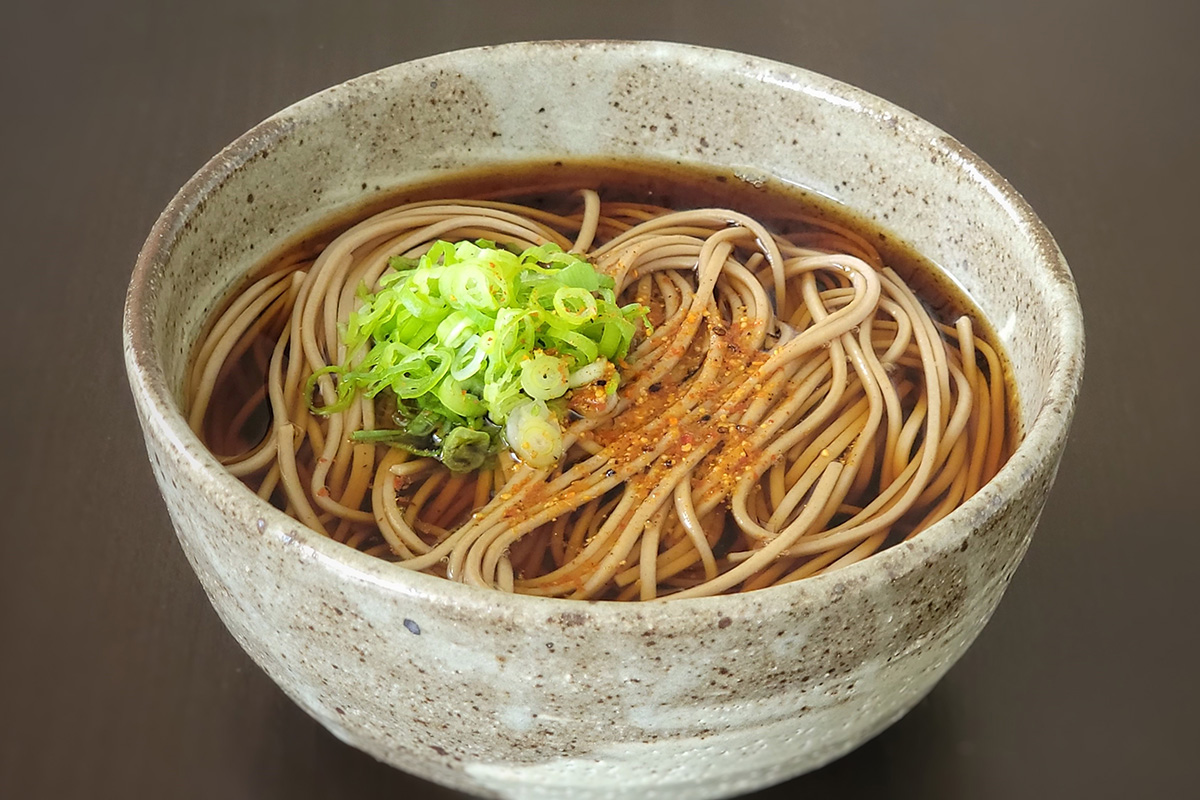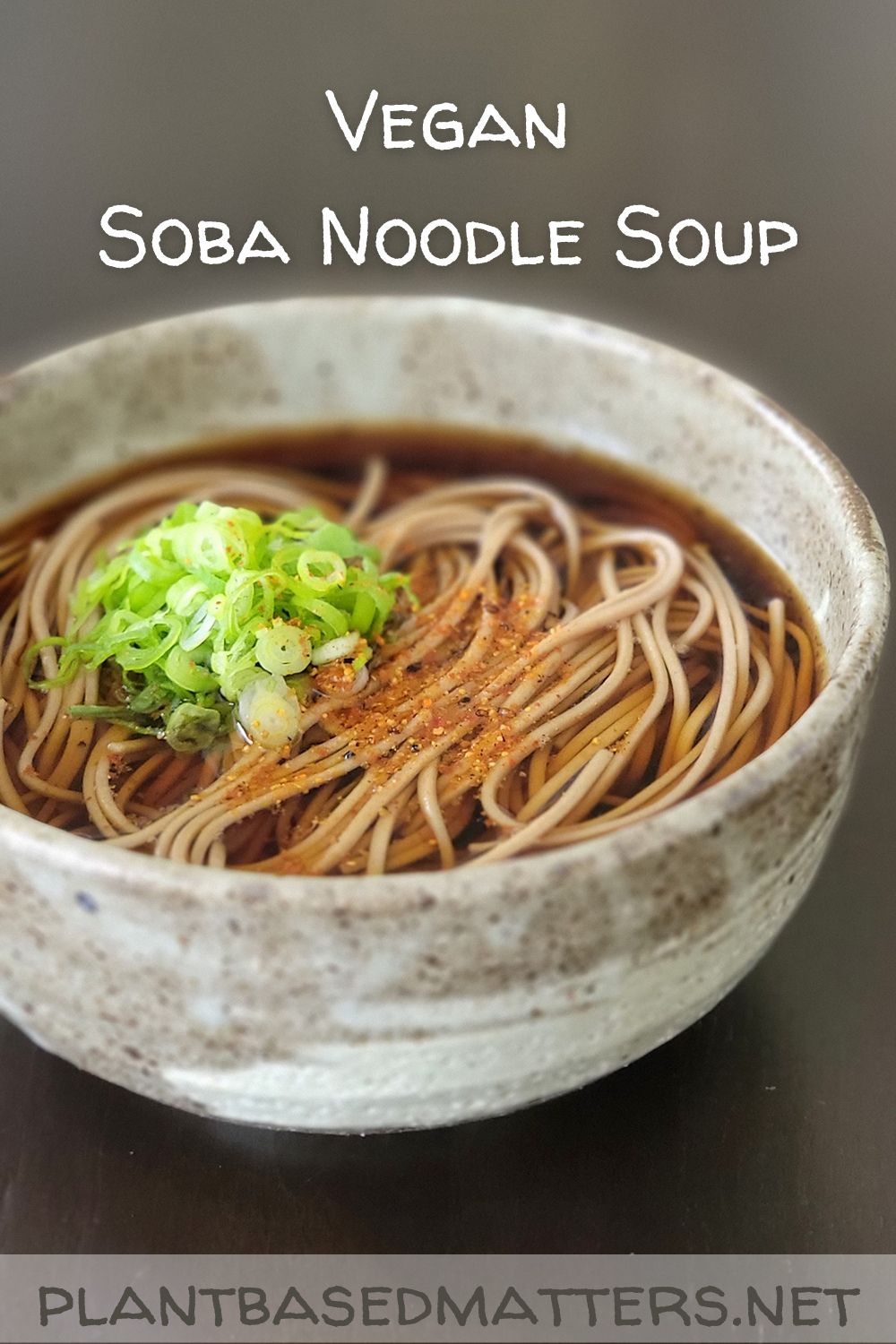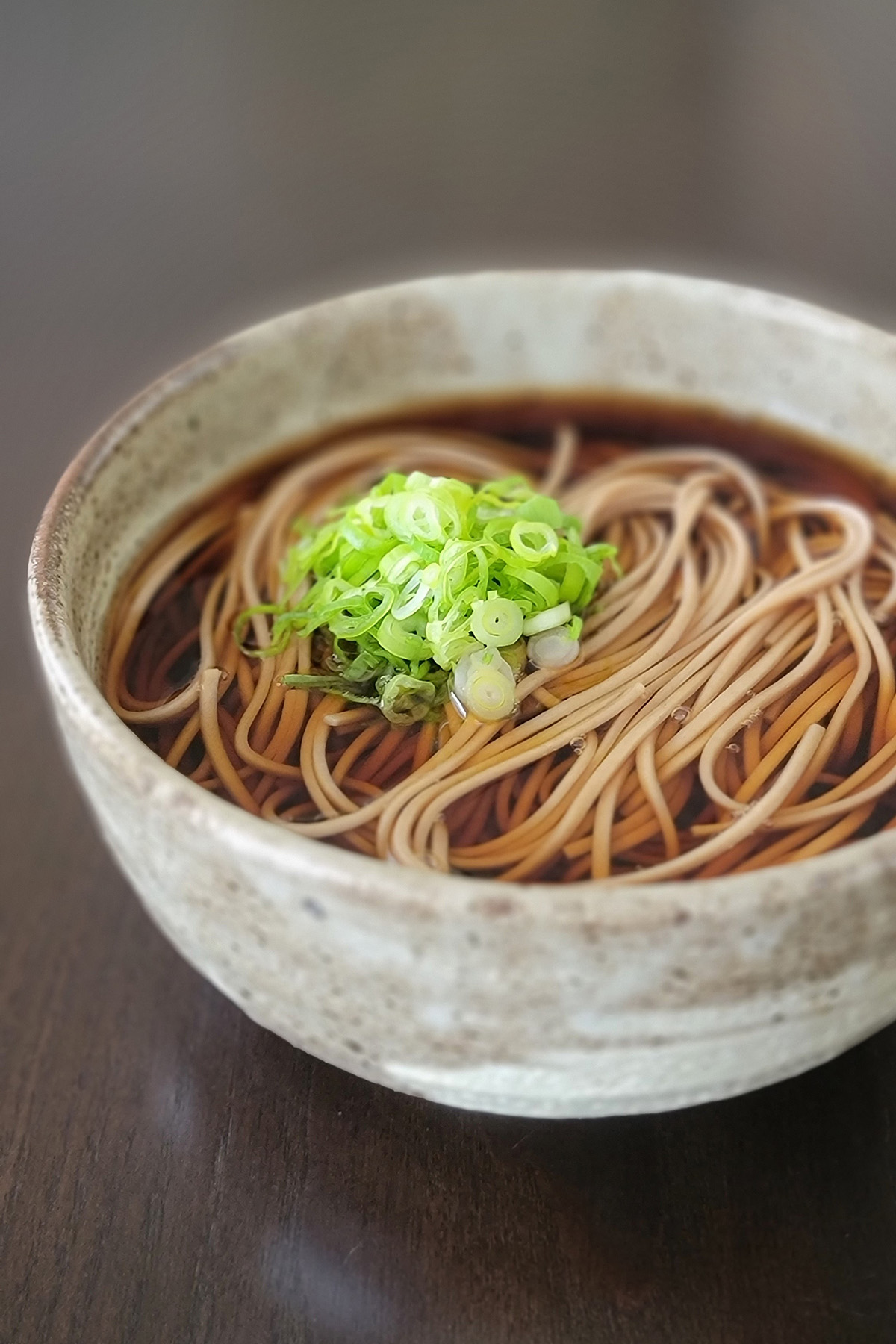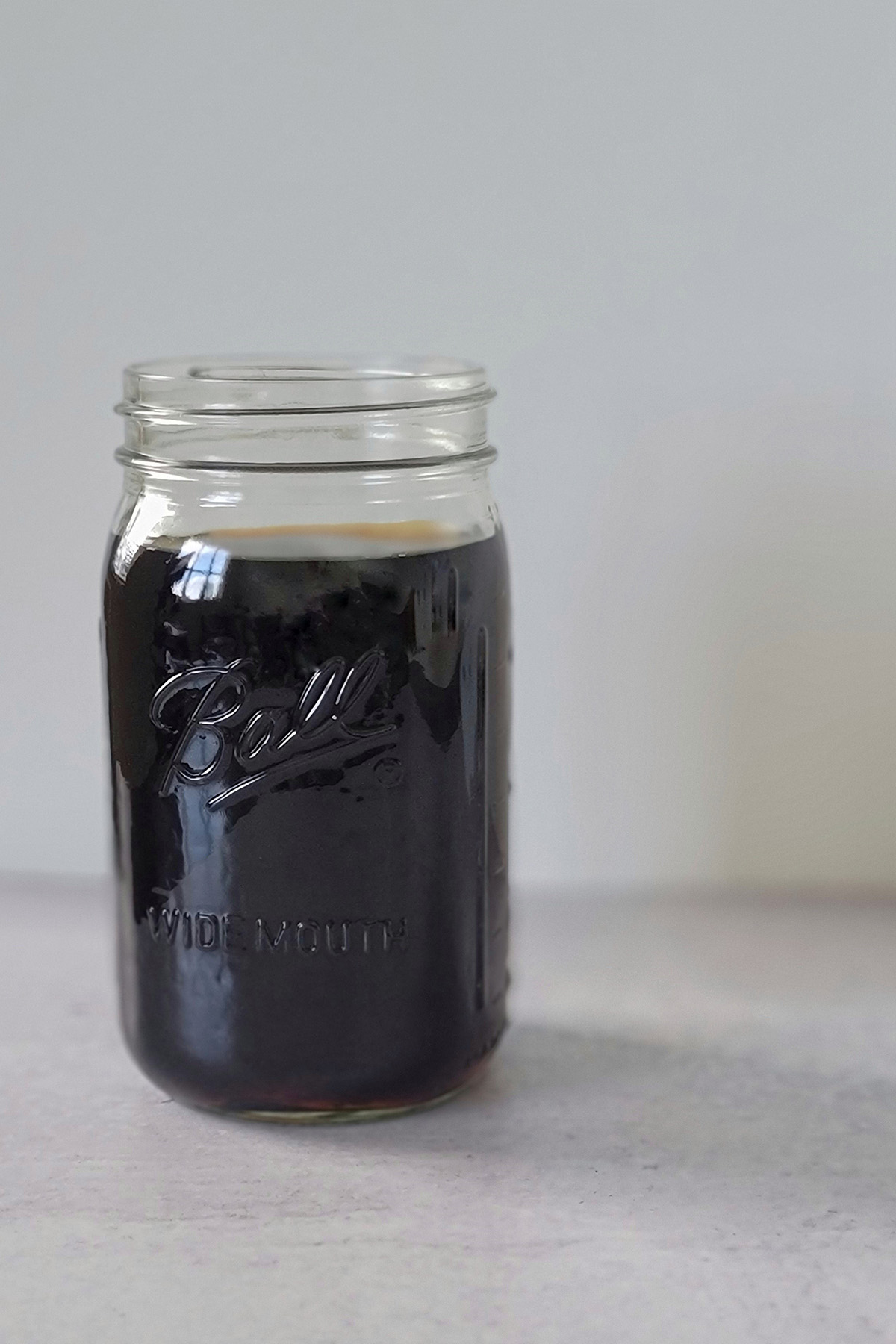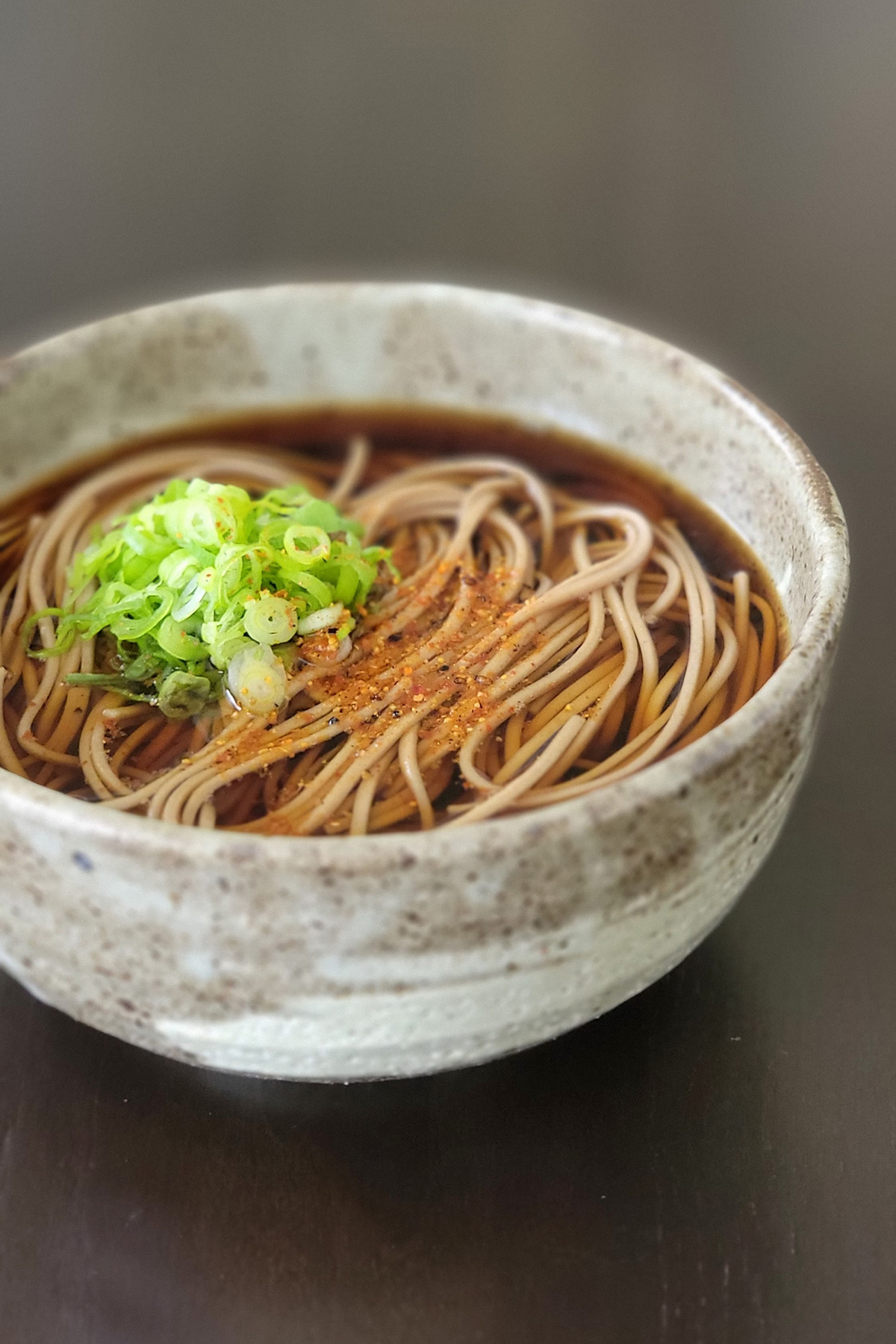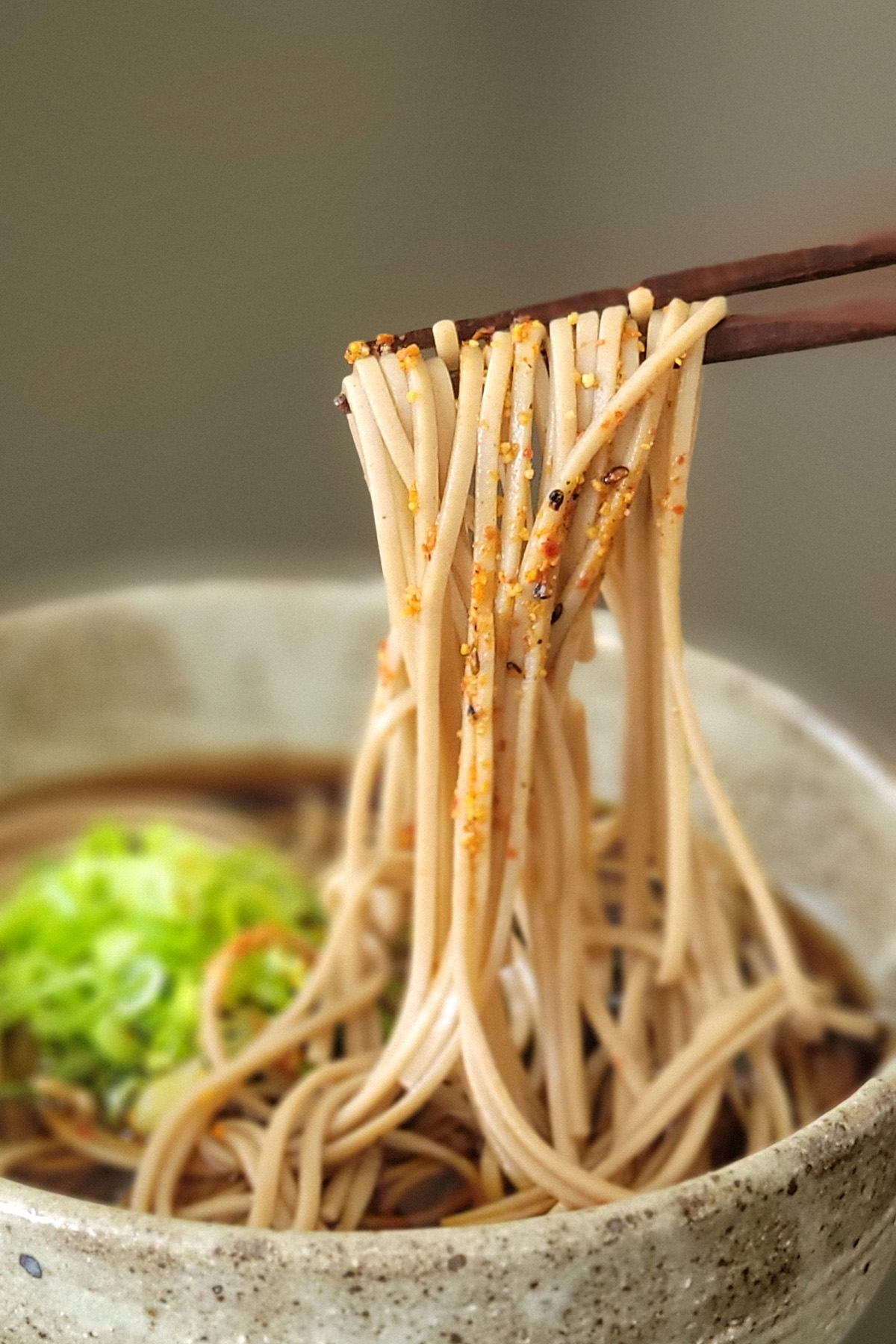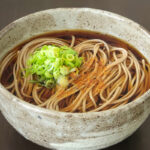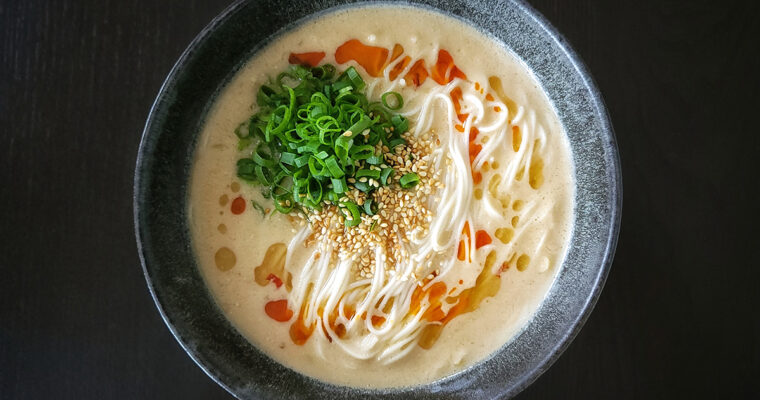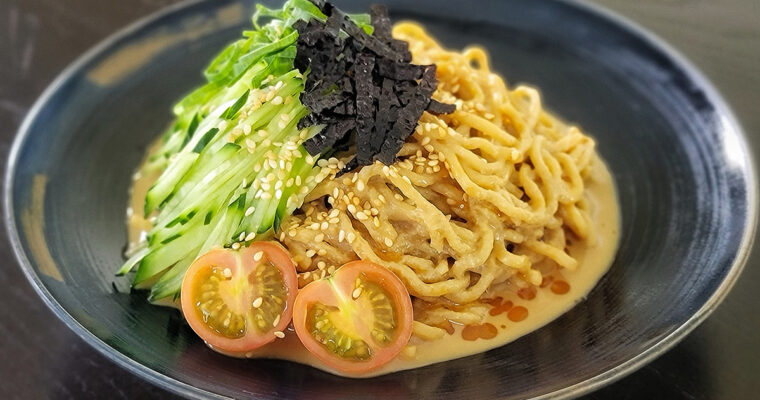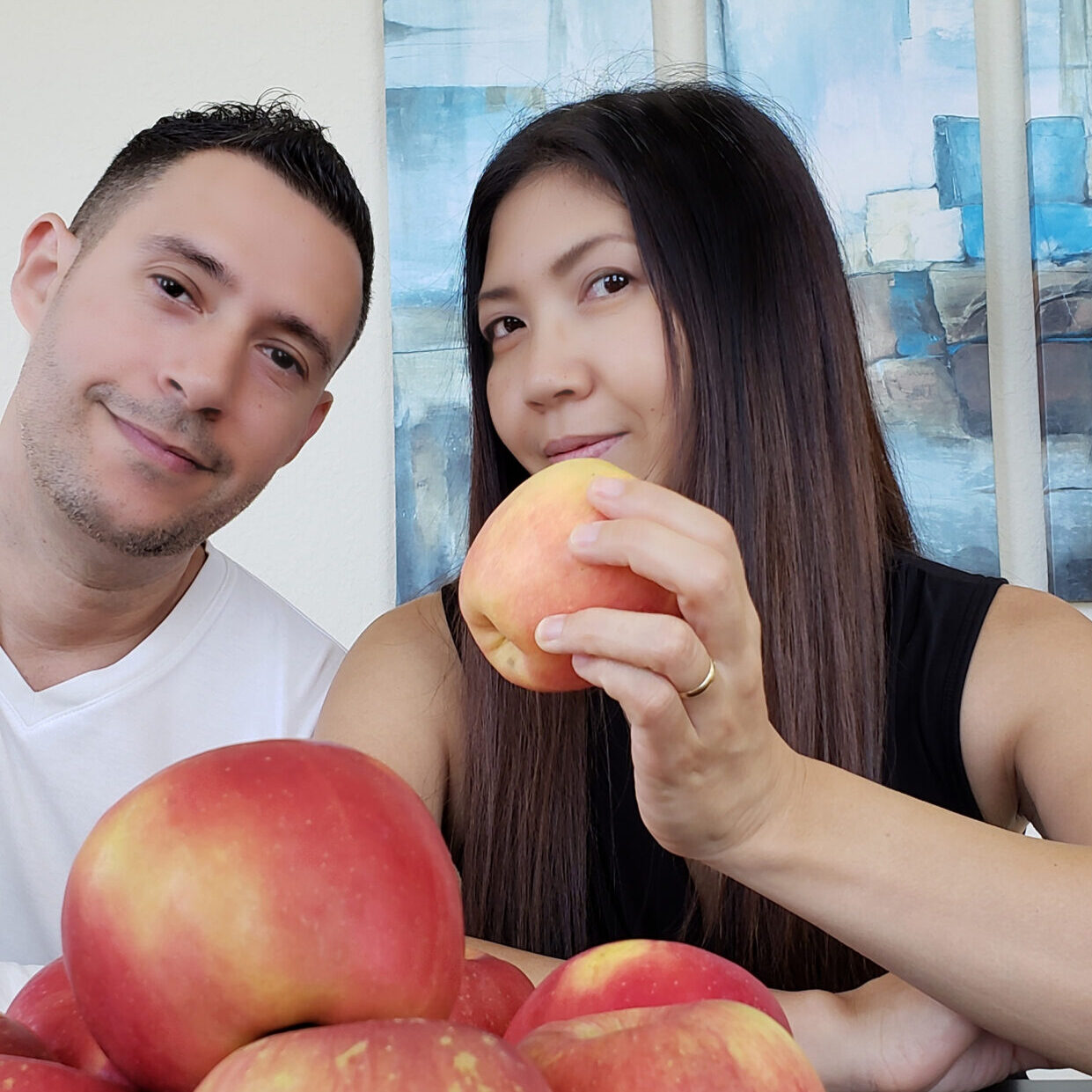Last Updated on June 3, 2023
[ヴィーガン温そば]
A warm bowl of Vegan Soba Noodle Soup is a vegan version of the traditional Japanese comfort food that’s prepared authentically minus the use of bonito flakes and/or high fructose corn syrup and other additives. This kombu dashi based vegan soba noodle soup tastes very clean yet it has a bold sweet & savory taste that brings out the flavor of soba noodles.
Soba Noodles
Soba noodles are an quintessential Japanese noodle that’s made with buckwheat. Most soba noodles are grey color thin noodles that tastes nutty and aromatic. In general, soba is considered healthier with more nutritional value than udon or somen noodles. If you use100 % buckwheat soba noodles, it’s gluten-free.
Please note that the broth I use for this recipe is NOT gluten-free.
If you include regional soba dishes with the certain preparation methods, there are several different types of soba noodle (buckwheat noodles) available in Japan. However, the below is a couple of the most common types of soba noodles:
- 100 % buckwheat soba | juwari-soba [十割そば]
- 80/20 % blend soba|hachiwari-soba or nihachi-soba [八割そば(二八そば)]
- Matcha-blend soba | cha-soba [茶そば]
100 % buckwheat soba (juwari-soba) is, as the name says it all, made with only buckwheat flour. It’s gluten free and the best way to appreciate the nutty taste of buckwheat.
80/20% blend soba (hachiwari-soba or nihachi-soba) is 80 % buckwheat flour and 20 % wheat flour. It’s not gluten free however the gluten from the wheat contribute to giving more texture and the chew to the noodles. The 80/20% blend is my personal favorite and I use this for the recipe!
Mathca-blend soba (cha-soba) is not as common but it’s so delicious! Just like 80/20 % blend, it’s a blend of buckwheat and wheat flour but matcha powder is added which make it very aromatic. Cha-soba is another favorite of mine.
Regardless of you preference, this vegan soba noodle soup recipe works with any soba noodles of your choice!
The Soup (Broth)
Vegan Soba Tsuyu Broth
This recipe features my vegan soba tsuyu broth made from scratch using my cold brew kombu dashi or simmered kombu dashi.
The cold brew one is super easy to make but takes 8-10 hours (or overnight) soaking. On the other hand, the simmered one takes only about 1 hour (5 minutes prepping, 30 minutes soaking and 25 minutes cooking.)
Vegan soba tsuyu broth is sweet & savory with a umami flavor from kombu (kelp) in the background. The sweet & savory flavor comes from soy sauce, mirin and sugar which complements the nutty flavor of soba noodles.
Traditionally speaking, soba tsuyu is made with kombu and bonito flakes (fish) which makes it not vegan. There are many soba tsuyu base products (non-vegan) for the convenience. However, these type of products often contain high fructose corn syrup or other chemicals & additives that you don’t want to consume.
My vegan soba tsuyu broth recipe uses only kombu as the dashi so it’s 100 % vegan. Of course, other ingredients are all clean and safe to consume. You won’t believe how delicious it is where you want to just sip all the way to the bottom of the bowl!
How to Serve Vegan Soba Noodle Soup
Simple is Best
This recipe is the simplest way to serve warm soba noodle soup. In Japanese, we call it kake-soba [かけそば] which literally means soba noodles with soup (broth) poured over. In japan, kake-soba is considered a humble and inexpensive dish where there’s a well-known emotional fairy tail titled “A Bowl of Kake-Soba.”
Kake-soba basically consists of soba noodles, soup (broth) and scallions as a topping. It’s very minimally presented but it’s super flavorful. Kake-soba is the best way to appreciate the flavor of each component because nothing else is in it.
Not to mention, you want to serve this immediately while it’s still hot.
Other Topping Suggestions (Optional)
If you want to use other toppings & condiments to soba noodle soup, my suggestions are:
- Shichimi pepper
- Wakame (seaweed)
- Grated daikon radish
- Grated Japanese mountain yam
- Veggie tempura (make sure it’s vegan/egg-free)
- Tempura bits (make sure that’s vegan/egg-free)
- Yuzu kosho
To serve with a side of nukazuke (Japanese pickles) or onigiri (Japanese rice balls) would also be fantastic! Carb on carb is my favorite way to eat 🙂
Vegan Soba Noodle Soup
Ingredients
Vegan Soba Tsuyu Broth
- 4 cups kombu dashi use my Cold Brew Kombu Dashi or Simmered Kombu Dashi
- 6 tbsp - 6 tbsp + 1 tsp soy sauce
- 6 tbsp - 6 tbsp + 1 tsp mirin Japanese sweet cooking rice wine
- 6 tbsp - 6 tbsp + 1 tsp sugar
The Rest
- 3 servings dried soba noodles of your choice
- 1 scallion finely chopped
- Shichimi pepper optional
Instructions
- Start boiling water in a large pot for cooking soba noodles.
- In the meantime, prepare the vegan soba tsuyu broth. Place the prepared kombu dashi in a sauce pan. Cover it and cook at medium high heat until a gentle boil.
- Once the kombu dashi is at a gentle boil, reduce the heat to medium. Add in soy sauce, mirin and sugar. Continue to cook for 1-2 minutes (uncovered) until the mirin’s alcohol is evaporated and the sugar is completely dissolved. Adjust the heat as necessary. Reduce the heat to medium low to keep it warm until the soba noodles are done.
- Once the water is boiling, start cooking dried soba noodles for 4 minutes or according to the instructions on the package. Keep your eye on it as it tends to overflow. Once the soba noodles are cooked, use a colander to drain and rinse with running water to remove some starch and stop the cooking. Shake off the excess water.
- Serve.Method 1: reheat the noodles in the soba tsuyu broth for a minute then transfer to a serving bowl.Method 2: pour boiling water (prepared separately) over the cooked soba noodles in the colander to reheat the noodles. Shake off the excess water then transfer to a serving bowl and pour the soba tsuyu broth over. Top with scallion and a dash of shichimi pepper for some heat (optional.)
Notes
Vegan Soba Tsuyu Broth
Kombu Dashi
-
- It’s easy to use my Cold Brew Kombu Dashi recipe as a base to make this vegan soba tsuyu broth.
- If using my Simmered Kombu Dashi, start with 1100 ml water / 37 fl oz purified water and 11 g / 0.4 oz kombu which should make about 960-1000 ml/32-34 fl oz (4 to 4 1/4 cups) kombu dashi that you can use for this recipe.
- The cold brew one is super easy to make but takes 8-10 hours (or overnight) soaking. On the other hand, the simmered one takes only about 1 hour (5 minutes prepping, 30 minutes soaking and 25 minutes cooking.)
Soy sauce
-
- For the savory flavor and rich dark color with a touch of umami.
- Use Japanese soy sauce for the authentic taste. I use Organic Soy Sauce from Gold Mine Natural Foods.
Mirin
-
- Mirin is Japanese cooking wine which adds the natural sweetness and depth to the broth. Use high quality mirin with no high fructose corn syrup.
- I use Organic Genuine Mirin from Gold Mine Natural Foods.
Sugar
-
- Use real sugar. Other sugar substitutes won’t taste the same.
- I use organic cane sugar. It’s vegan (no bone char.)
Ingredient Ratio
-
- The basic formula that you can use to make vegan soba tsuyu broth is 10 parts dashi, 1 part soy sauce, 1 part mirin, 1/3 part sugar.
- The best way to measure the volume is using a scale for accuracy.
- You can adjust the amount of soy sauce, mirin and sugar to your preference.
Serving Size
-
- The default Vegan Soba Tsuyu Broth recipe yields enough for 3 servings of hot soba noodle soup (about 1000 ml.)
- 1 serving of vegan soba tsuyu broth is about 300-330 ml/10-11 fl oz.
How to Store
-
- You can store the leftover in a container with a lid and keep in the fridge for 2-3 days or in the freezer for up to 3 weeks for the best flavor.
- Frozen vegan soba tsuyu broth can be thawed in the fridge for 36-48 hours or at a room temperature for a shorter time.
Choice of Soba Noodles
- You can use any soba noodles of your choice; 100 % buckwheat, wheat blend, or cha-soba (green tea blend.)
- I use the wheat blend which has a chewy texture compared to 100 % buckwheat.
Topping Suggestions
The simplest way to serve soba noodle soup is with scallions. Other choices are:- shichimi pepper (Japanese seven-spice blend chili pepper flakes)
- wakame (seaweed)
- grated daikon radish
- grated Japanese mountain yam
- veggie tempura (make sure it's vegan/egg-free)
- tempura bits (make sure that's vegan/egg-free)
- yuzu kosho
If you enjoy the recipe, please share, leave a comment below and tag us @plantbased_matters on Instagram! We appreciate your kind support 🙂
